The Strategies for Knowledge Management of Phrapariyattidhamma Schools, General Education Department, KhonKaen Province
Main Article Content
Abstract
The purposes of this research were to study the components and indicators of knowledge management, to study the current situation and the desirable conditions of knowledge management, and to develop the strategies for the desirable knowledge management of Phrapariyattidhamma schools, general education department, KhonKaen province. The informants included 36 school administrators and 196 teachers, with the total number of 232 people. The sample size was determined by R.V.Krejcie& D.W. Morgan (1970) by using stratified random sampling method. The research instruments were component evaluation and 5-level rating scale questionnaire with value of Index of Item–Objective Congruence (IOC) between 0.80-1.00 and reliability at 0.98.4 The statistics used for data analysis comprised mean, standard deviation and reliability.
The research results were found that:
1.The current situation of knowledge managementof Phrapariyattidhamma schools, general education department, KhonKaen province, in overall, was rated at a moderate level. When considering in each aspect, it was found that the aspect with the most practice was knowledge recording, the desirable conditions of knowledge management of Phrapariyattidhamma schools, general education department, KhonKaen province, In overall, was found that it was rated at the highest level.
2.The strategies for the desirable knowledge management of Phrapariyattidhamma schools, general education department, KhonKaen province, with the goal to develop students to be qualified people in accordance with the purpose of knowledge management of Phrapariyattidhamma schools, general education department, KhonKaen province, consisted of 6 strategies, namely 1)knowledgedetermination, 2)searching for knowledge, 3) improvement/creation of knowledge 4)application of knowledge 5) exchange of knowledge and 6) knowledge recording.
Article Details
References
Guidelines for educational. (2009).management according to the school curriculum the basic Phrapariyattidhamma Schools, Bangkok.
KanyaratTeerathanachaiyakun. (2014). Knowledge management Success Factors.Panyapiwat Journal. Vol.5 Special Issue May 2014.
KriengsakCharoenwongsak. (2006). Strategic thinking. Bangkok. Success Media.
Krejcie, R. V. and Morgan D. W. (1970). Determining Sample Size for
Research Activities.Educational and Psychological Measurement.30, 607–610.
Ministry of Education. (2009). Core curriculum for basic education 2008. Bangkok. Agricultural Cooperative Assembly Printing Company Limited.
Miss CHEN ZHU (2014). Knowledge Management Strategies of Chinese Company Invested in Thailand in Electronic and Chemical Plastic Industry. Master of Business Administration Program. Dhurakij Pundit University.
RungThiwaMulsathan. (2014). Development of Teacher Students’ Competencies toConform with the Maehongson Context. Management Journal. Faculty Management Science lampang Rajabhat University. Vol. l 7, No 1 January - June 2014.
SuwimonWongwanich. (2007). Needs assessment research. Bangkok. Publisher of Chulalongkorn University.
VicharnPanich. (2004). Knowledge management for practitioners.(2nd Edition). Bangkok. Mental health

